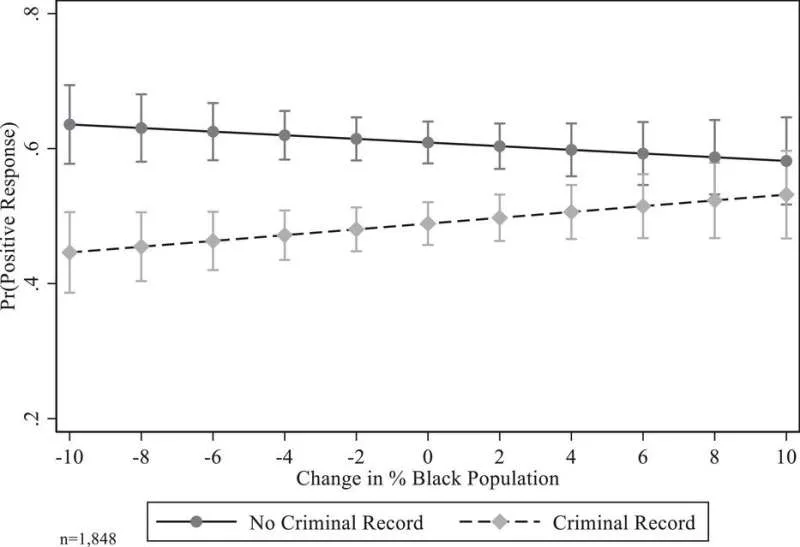
Individuals involved with the criminal justice system experience high levels of housing instability and move frequently, but little is known about how the stigma of having a criminal record affects attempts to rent housing. A new study examined how landlords in Ohio used criminal records to screen tenants.
The study found that many landlords disqualified all tenants with a criminal record, with the incidence higher in gentrifying neighborhoods and in areas where the proportion of Black residents was dwindling. In this way, criminal records screening reinforces racial inequities, say the authors.
The study, by a researcher at North Carolina State University (NC State), appears in Criminology.
“Neighborhood conditions are powerful determinants of many social outcomes, including economic opportunities and the likelihood of recidivism,” says Laura M. DeMarco, assistant professor of sociology and anthropology at NC State, who conducted the study. “We need to understand how landlords look at criminal records and whether criminal record screening reflects or motivates changes in neighborhood composition.”
Increasingly, landlords have access to information about prospective tenants, including rental history, credit scores, employment, and personal references. As laws have been enacted to prohibit explicitly racist and other discriminatory practices in renting, criminal background checks have become central to tenant screening practices, with prior studies showing individuals with the most stigmatizing criminal histories (e.g., sex offenses) having the worst housing opportunities.
DeMarco, instead, highlights the growing prevalence of broad criminal record screening practices by examining landlords’ willingness to rent to individuals who have a criminal record without knowing any details about type, severity, or timing of the offense.
In the study, DeMarco conducted an online correspondence audit, a type of audit done entirely without face-to-face communication, in Ohio to test nearly 1,000 landlords’ behaviors in renting to people with criminal records. She used rental postings from a popular website that offered variation in units’ size, type, and cost.
The study collected data from October through December 2018 and from January through April 2019. Landlords received a submission form from the website from a potential renter; half received a message telling the landlord about the applicant’s criminal record. All applicants were employed; their race and gender were conveyed through their names.
Many housing providers disqualified all tenants with a criminal record without ever seeing information about the severity or timing of their offenses. Specifically, DeMarco found that of the almost 1,900 messages sent to landlords, about 55% received a positive response, which varied significantly across race and gender.
Black and Hispanic men had significantly lower response rates than White men. More than 60% of messages sent without a criminal record disclosure received a positive response, while only 49% of messages disclosing a criminal record received a positive response. The broad disqualifying effect of a criminal record in rental housing held within each demographic group.
The impact of having a criminal record varied by neighborhood: It was twice as large in gentrifying neighborhoods than in non-gentrifying neighborhoods, and it was stronger in communities where the relative size of the Black population was shrinking. Excluding applicants with criminal records appears to be a mechanism for neighborhood change.
“Criminal record screening is a central obstacle faced by the justice-involved population,” explains DeMarco. “Difficulties finding a home amplify struggles with employment, health, and well-being.”
DeMarco suggests that although criminal records screening is technically a race-neutral approach, it reinforces and reproduces racial inequalities. Across cities in Ohio, this type of screening appeared to facilitate neighborhood turnover and extend the legacies of segregation and discrimination, functioning as a new linchpin of racial inequality. “Fully understanding the effects of criminal histories on housing opportunities is essential to dismantling the broader system of inequalities created and perpetuated by the criminal legal system,” she says.
Among the study’s limitations, DeMarco says the study’s focus on one state limits the generalizability of her findings. In addition, the survey she used focused on renters’ initial willingness to rent, making them relatively conservative estimates of discrimination.
More information:
Laura M. DeMarco, Criminal record stigma, race, and neighborhood inequality, Criminology (2023). DOI: 10.1111/1745-9125.12347
Provided by
American Society of Criminology
Citation:
In Ohio, individuals with criminal records are routinely disqualified from renting homes (2023, July 19)
retrieved 19 July 2023
from https://phys.org/news/2023-07-ohio-individuals-criminal-routinely-disqualified.html
This document is subject to copyright. Apart from any fair dealing for the purpose of private study or research, no
part may be reproduced without the written permission. The content is provided for information purposes only.


